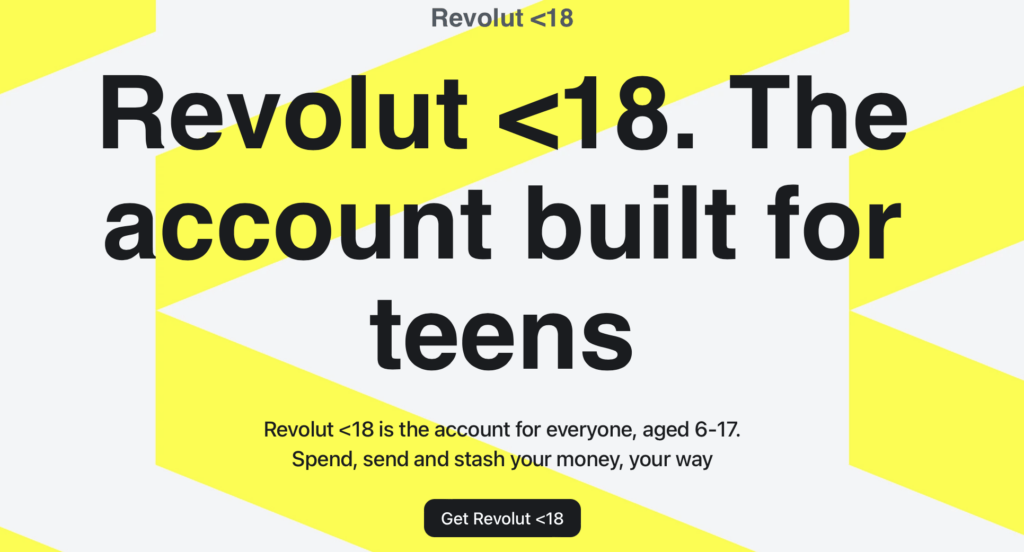One of the main jobs you have as a parent is to ensure your child grows up to be responsible and independent. Financial education is an important and often challenging part of this task, but you don’t have to do it alone—you can leverage technology to make the learning process easy and fun.
Still, finding dedicated credit card apps for teens may not be possible—you’ll typically run into more comprehensive banking platforms that might include credit card management as one of their many features.
Besides, many teens can’t get a credit card in the first place, but you can still use such apps to be proactive about their financial skills.
With that in mind, this guide will show you several banking apps for different uses and age groups. Before exploring some popular options, though, it’s worth explaining how your child can benefit from them.
How a Kid Bank Account App Helps Children Learn About Money
Many financial concepts—particularly credit products—are too abstract for young teens. Explaining them in theory is better than nothing, but it may not be enough to ensure this knowledge translates into proper money management skills.
Banking apps give children hands-on experience with money alongside various engaging educational formats, most notably:
- Interactive courses
- Videos
- Quizzes
All of this is typically done under the parent’s close supervision, ensuring the child doesn’t make costly mistakes.
Older teens can also benefit from an app, as it can introduce them to different payment methods and encourage saving. They can use apps to manage their income and enjoy more independence. Depending on your child’s maturity and needs, you can find many options that will contribute to their overall financial awareness.
Three Child Bank Account Apps To Consider
To see how all of the aforementioned benefits work in practice, you can check out the following apps:
- Revolut <18
- Copper
- Current
The following breakdowns of each option will help you choose the best one based on your teen’s age and goals.
Revolut <18

Source: Revolut
Revolut <18 combines a robust app with a prepaid card—a common alternative for children who aren’t eligible for credit cards or other financial products. A prepaid card lets parents load their child’s account with money and control their spending.
The app is available for iOS and Android devices. If your child is 13 or over, they can create their own account, which you’ll approve to get started. You’ll have to create an account for your child if they’re under this threshold, which you can do through your own Revolut app.
Revolut <18 has various features that give your teen an opportunity to learn about money management, most notably:
- Savings goals—Your child can set a specific savings goal and track their progress through the app
- Chores—You can set up chores your child needs to complete before you can load the card
- Budgeting—Children can limit their budget to a specific amount and stick to it
Note that your child can’t deposit funds to their card, which may be inconvenient if they start a job or earn some pocket money they want to store on it. You also need to have a Revolut account so that you can give your child access to Revolut <18. If you close your account, theirs will be closed as well.
The following table summarizes the pros and cons of Revolut <18:
| Pros | Cons |
| Suitable for teens of all ages Encourages saving Lets parents pay children for chores | The child can’t load their own card Tied to the parent’s Revolut account |
Copper

Source: Copper
Copper offers a checking account in the parent’s name and a debit card for their child. Any child over six can be a cardholder, though the Copper app is more geared toward older teens.
The first reason for this is Copper’s support of direct deposits, which lets teens receive their salary in the account. The app also supports peer-to-peer sharing, so your child can send money to their friends and vice versa.
Copper has a large knowledge base covering numerous financial matters, including the following:
- Credit
- Banking
- Investing
- Budgeting
- Earning and saving money
Your child can take quizzes to assess their knowledge, which gamifies the learning experience and makes it more enjoyable.
If you sign up for the Copper + Invest plan, the child will also get access to a portfolio of investment assets tailored to teens. They can start investing with as little as $1, so this is a low-risk way for them to start thinking about long-term wealth.
A lack of strict parental controls fortifies Copper’s focus on older children looking for more independence. You can monitor their spending but can’t do much to limit it. There’s also no chore assignment or tracking, but you can still load the child’s card with funds.
You can quickly compare Copper’s benefits and drawbacks in the following table:
| Pros | Cons |
| Direct deposits Large knowledge base Investment opportunities | Limited parental controls No chore assignment |
Current

Source: Current
Current is suitable for teens of different ages because it combines some of the best features of Revolut <18 and Copper:
- Parental controls and chore assignment
- Direct deposits
- Budgeting, saving, and money management tools
- Investment options (limited to cryptocurrencies)
The platform encourages saving with a 4% annual percentage yield (APY), but only for up to $6,000. The rate doesn’t apply to higher amounts, which may be a bit limiting.
Current is free to use, and parents can sign up for their children. You can also set up a custodial account for your child to help them save without the risk of overspending.
While Current offers cash deposits, they cost $3.50 per transaction. It may be more convenient and cost-effective to use mobile check deposits.
The following breakdown compares Current’s advantages to its pitfalls:
| Pros | Cons |
| Free to useVarious parental controls Support for custodial accounts | Limited APY-earning balance No free cash deposits |
How To Support Your Child’s Independence Besides Banking Apps
Banking apps can prepare your child for various financial products that require responsibility, such as credit cards. You’ll have ample time to teach them all they should know, as your child may not qualify for a card before turning 21. The only exceptions are children who can meet one of the two conditions imposed by the CARD Act of 2009:
- An independent ability to repay the debt
- A co-signer over 21 who can guarantee the card
You can add a child as an authorized user of your card to make them more independent sooner, but doing so can be quite risky. Many banks don’t let you set a limit to an authorized user’s spending, so your child may use the card excessively and deepen your debt.
A much better way to prepare your child for a financially stable adulthood is to help them build credit early on. This is something that FreeKick can help with.
FreeKick—Safe and Easy Credit Building for Children Ages 14–25
Created by Austin Capital Bank, FreeKick lets parents establish and build their children’s credit profiles without effort or risk. It combines a Federal Deposit Insurance Corporation-insured (FDIC-insured) deposit account with credit building and monitoring services.
All it takes is a one-time FDIC-insured deposit, and your teen will build credit on autopilot. You can choose from three deposit amounts with corresponding plan fees:
| FDIC-Insured Deposit Amount | Plan Fee |
| $2,500 | Free |
| $1,750 | $49/Yr |
| $1,000 | $99/Yr |
When you decide on the deposit amount that meets your budget, you can get started with FreeKick in three simple steps:
- Create an Account—Go to FreeKick.bank to place your deposit and open the account
- Set It and Forget It—FreeKick will build your child’s credit history for 12 months
- Keep Growing—When the 12-month term ends, you can renew the account for another one to build up to 48 months of credit history for your child
If your child is a legal adult—18 and over in most states—FreeKick will start reporting their credit history to the three major consumer credit bureaus (Equifax, Experian, and Transunion).
Credit bureaus only accept reporting for adults, so if your child isn’t one yet, FreeKick will report their credit history once they reach legal age and activate reporting.
With this in mind, note that your child’s credit history can’t be reported if you close the account before they become a legal adult. You’d still get your deposit back, even if you closed the account before the end of the 12-month term.
Stay on Top of Your Child’s Credit Profile With FreeKick’s Monitoring Services (Coming Soon)
Monitoring your child’s credit profile helps them stay on the right track and proactively take action to improve their credit score. It also keeps their profile free of errors that might cause complications during the loan application process.
To ensure you don’t need to do this alone, FreeKick offers a range of credit monitoring services. They come with your account at no additional cost, giving you and your child much-needed peace of mind.
Ongoing monitoring is also among the most effective ways to reduce the risk of child identity theft. This crime robs U.S. families of almost $1 billion annually and can have severe consequences on your child’s credit profile.
This is because financial criminals use children’s Social Security numbers (SSNs) to create synthetic identities, which means any fraudulent activity gets tied to your child’s.
FreeKick helps prevent this and protects children with the following security measures:
- Tracking of all names, aliases, and addresses associated with your child’s SSN
- Monitoring of internet activity related to the potential trading of the child’s personal information
- Full-service ID restoration and a $1 million ID theft insurance
- Sex offender monitoring that identifies and tracks all registered sex offenders in your area
- Additional services for adult children:
- Lost wallet protection
- Change of address monitoring
- Payday loan monitoring
- Court records monitoring
Improve your child’s creditworthiness and keep their credit profile clean—sign up for FreeKick.
Featured image source: Anete Lusina




